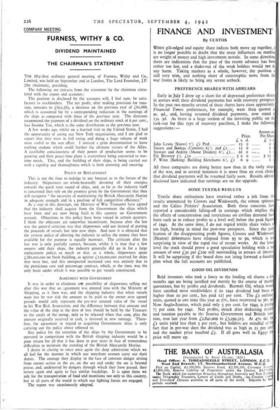FINANCE AND INVESTMENT
By CUSTOS
WHEN gilt-edged and equity share indices both move up together, it is no longer possible to doubt that the main influences on markets are weight of money and high investment morale. In some directions there are indications that the pace of the recent advance has been rather too hot, and a shake-out of the weak holders would not do any harm. Taking markets as a whole, however, the position it still very trim, and nothing short of catastrophic news from the war fronts is likely to bring any severe setback.
PREFERENCE SHARES WITH ARREARS
Early in July I drew up a short list of depressed preference shares in arrears with their dividend payments but with recovery prospects. In the past two months several of these shares have risen appreciably. Financial Times preferences, for example, were then quoted at 13s. 3d. As there is a large section of the investing public on the look-out for this type of recovery purchase, I make the following
suggestions : —
Price.
£ s. d.
John Lewis (Stores) 7% £i Pref.
15 0 Slaters and Bodega (Caterers) 61% and £i 13 6 Stewart and Ardern (Motor Dealers) 6% £x to o Ely Brewery 5% £m 3 0 0 P. Winn (Barking) Building Merchants 6% £i 6
9
SOME TEXTILE RESULTS
Textile share enthusiasts have received rather a jolt from the results announced by Crosses and Winkworth, the cotton spinners. and the Calico Printers' Association. Both these concerns have reported a considerable falling-off in earnings which implies tha: the effects of concentration and restrictions on civilian demand has been such as to reduce profits to a level well below the peak figure: of 1940. At the same time, I do not regard textile share values as too high, bearing in mind the post-war prospects. Since the pu lication of the disappointing profit figures, Crosses and Winkwor (Heaton) debentures have relapsed from 95 to 9o, which is no surprising in view of the rapid rise of recent weeks. At the low level the stock should prove a good speculative holding with a II amount of over £30 per LI oo still outstanding in arrears of intere It will be surprising if the board does not bring forward a 4undi plan when the full accounts are published.
GOOD OIL DIVIDENDS Bold investors who took a fancy to the leading oil shares a fe months ago are being justified not merely by the course of mar quotations, but by profits and dividends. Burmah Oil, which wool have satisfied most stockholders if its 1941 dividend had been higher than to per cent., has paid 121 per cent. The LI orcl. units, quoted at one time this year at 27s., have recovered to 36s. Now Anglo-Iranian, which paid only 5 pee cent, for 1940, is parrs 71 per cent. for 1941. Net profits, struck after deducting royal and taxation payable to the Iranian Government and British t tion, rose last year from £2,841,909 to £3,292,315. At 47s. 6d. £i units yield less than 3 per cent., but holders are mindful of th fact that in pre-war days the dividend was as high as 25 per ceil and the market price touched £5. If all goes well in Egypt th price will move up.
9s. 9d., and, having resumed dividend payments, now stand at
Arrears na Per Share £ s. d 2 9 2 0
***** 0 9 3 15 0
2 0
All these companies are doing better now than in the early stags of the war, and in several instances it is more than an even chana that dividend payments will be resumed fairly soon. Results already disclosed have indicated that earnings are on the upgrade.


























 Previous page
Previous page